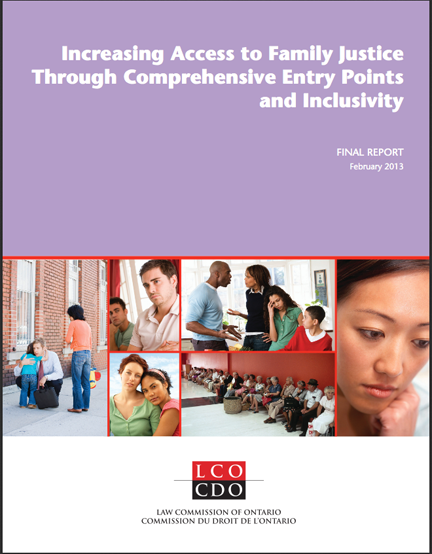The majority of family law litigants navigate the justice system solo, but Ontario’s court system runs on the assumption every is represented by counsel, according to the Law Commission of Ontario’s
final report on family law reform. It’s time the system mirrors reality, it says.

“With some (important) exceptions, our system presumes homogeneity on the part of users, it is premised on the presence of lawyers who have specialized knowledge and training to shepherd lay people through the system and for the most part, it divorces the legal problem from the other issues that attend relationship breakdown,” states the report released today.
“We believe that any further reform of the system must address these issues in order to create meaningful access to the family justice system for the citizens of Ontario.”
Created in 2009, the law commission’s family law project set out to find out how to simplify and improve a system often said to be in crisis.
As legal representation becomes an option only for the very rich or very poor, ordinary Ontarians are left to their own — and the Internet’s — devices, often with ineffective outcomes, says the report.
While online self-help tools are important, their usefulness to people without access to computers or literacy skills is overestimated, the report adds, noting some in-person assistance is needed to help litigants apply generic advice to their specific legal issues.
“There’s a tendency now that if we provide people with enough information, they can represent themselves,” says Patricia Hughes, the family law reform project head at the Law Commission of Ontario. “That’s not the case.”
The benchmarks of a comprehensive service include creating a single online “hub” for family law information, making written information available for those without access to computers, and providing assistance to people who cannot synthesize this information, says Hughes.
In another key message, the report says the issues family law litigants face can be addressed not just by the justice system, but through a more holistic approach that leverages the connection and know-how of community organizations, such as immigrant settlement centres.
The law commission recommends the Ontario government launch two pilot projects in different areas of the province to test drive a service based on the benchmarks they provide.
But ensuring access also means rethinking what lawyering means, the report says.
“We must take a hard look at what ‘lawyering’ entails and find ways to create competent and effective legal services outside full scope representation by a lawyer,” it states.
“Delivering legal services differently may mean that lawyers do not provide full-service delivery or do not provide them through private practice; it may mean alternative billing arrangements or ‘a limited scope retainer’ (also known as ‘unbundled services’).
“Delivering services through different people may mean paralegals, if they are given authority to do so, or students, both within prescribed parameters.”
While Legal Aid Ontario cannot expand its services to middle class Ontarians without “a significant infusion of funds,” perhaps the organization can be act as a “broker” for low-cost legal services, the report suggests.
For more detail and analysis on the report, look for the Law Times article on Monday.

 “With some (important) exceptions, our system presumes homogeneity on the part of users, it is premised on the presence of lawyers who have specialized knowledge and training to shepherd lay people through the system and for the most part, it divorces the legal problem from the other issues that attend relationship breakdown,” states the report released today.
“With some (important) exceptions, our system presumes homogeneity on the part of users, it is premised on the presence of lawyers who have specialized knowledge and training to shepherd lay people through the system and for the most part, it divorces the legal problem from the other issues that attend relationship breakdown,” states the report released today.